The Average Cost of Dental Implants in India: 2025 Pricing Guide reveals why implants are now considered the most reliable solution for missing teeth. With advanced dental technology and highly trained specialists across major cities, more patients are choosing implants over bridges or dentures, and the Average Cost of Dental Implants in India: 2025 Pricing Guide explains the price differences clearly.
According to the Average Cost of Dental Implants in India: 2025 Pricing Guide, a single implant generally ranges from ₹25,000 to ₹60,000, while full-mouth procedures may cost between ₹2,00,000 and ₹5,00,000 depending on the treatment method. The Average Cost of Dental Implants in India: 2025 Pricing Guide also shows how these prices remain far lower than in the US or UK, where a single implant can cost several thousand dollars.
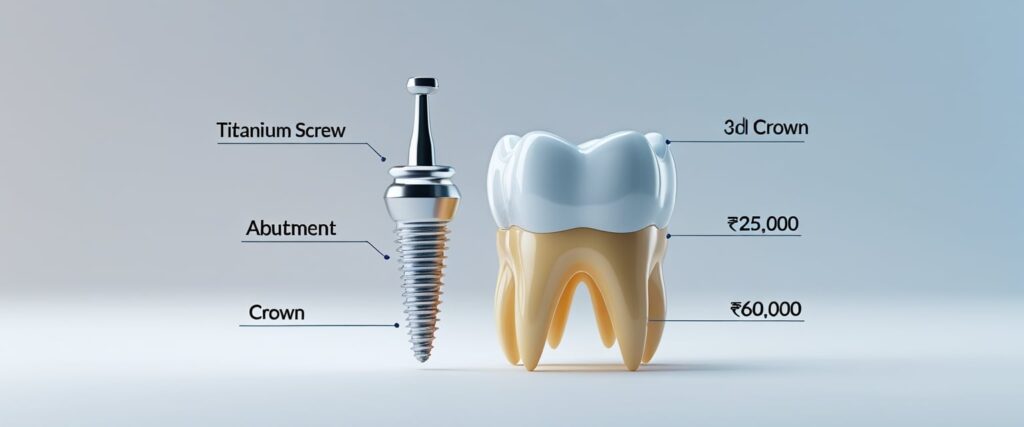
Many international patients rely on the Average Cost of Dental Implants in India: 2025 Pricing Guide before traveling, since it highlights India’s cost advantage without compromising on quality. The Average Cost of Dental Implants in India: 2025 Pricing Guide further breaks down factors such as implant type, crown material, clinic location, and additional procedures.
Ultimately, the Average Cost of Dental Implants in India: 2025 Pricing Guide gives patients a clear overview of what to expect. By using the Average Cost of Dental Implants in India: 2025 Pricing Guide, anyone can make informed choices, compare treatment options, and understand why India has become a leading destination for affordable, high-quality dental implants.
Average Cost of Dental Implants in India
Dental implants in India are priced based on the type of implant, the number of teeth being replaced, and where the treatment is performed. Costs differ between single tooth replacements and full mouth implants, and patients also see price variations depending on the city and clinic reputation.
Single Tooth Implant Costs
The Average Cost of Dental Implants in India: 2025 Pricing Guide highlights that a single implant typically ranges from ₹25,000 to ₹60,000 per tooth, including the titanium fixture, abutment, and crown. According to the Average Cost of Dental Implants in India: 2025 Pricing Guide, premium systems such as Straumann or Nobel Biocare may cost between ₹50,000 and ₹1,00,000 per tooth because they offer long-term durability and proven success rates.
As explained in the Average Cost of Dental Implants in India: 2025 Pricing Guide, the choice of crown material also plays an important role in pricing. Zirconia crowns, which provide a natural and aesthetic finish, are usually more expensive, while metal-ceramic crowns remain a cost-effective alternative. Patients reviewing the Average Cost of Dental Implants in India: 2025 Pricing Guide will also see that supportive procedures like bone grafting or sinus lifts can add an additional ₹15,000–₹50,000 depending on complexity.
The Average Cost of Dental Implants in India: 2025 Pricing Guide makes it clear that understanding these variations helps patients plan better, ensuring transparency before treatment. By relying on the Average Cost of Dental Implants in India: 2025 Pricing Guide, anyone considering implants can compare brands, crown types, and extra procedures to make a confident and informed decision.

Compared to countries like the US or UK, where a single implant can cost $2,500–$4,000, the cost of dental implants in India is significantly lower, making it an attractive option for both local patients and dental tourists.
Full Mouth and All-on-4 Implant Pricing
For patients missing several teeth, full mouth implants or All-on-4/All-on-6 systems are more cost-effective than replacing each tooth individually. The All-on-4 full arch implant typically costs ₹2,00,000–₹3,50,000, while All-on-6 can cost between ₹2,50,000–₹4,50,000.
More complex cases, such as those requiring zygomatic implants, can range from ₹5,00,000 to ₹7,00,000 for a full arch. These are usually recommended when there is severe bone loss in the upper jaw.
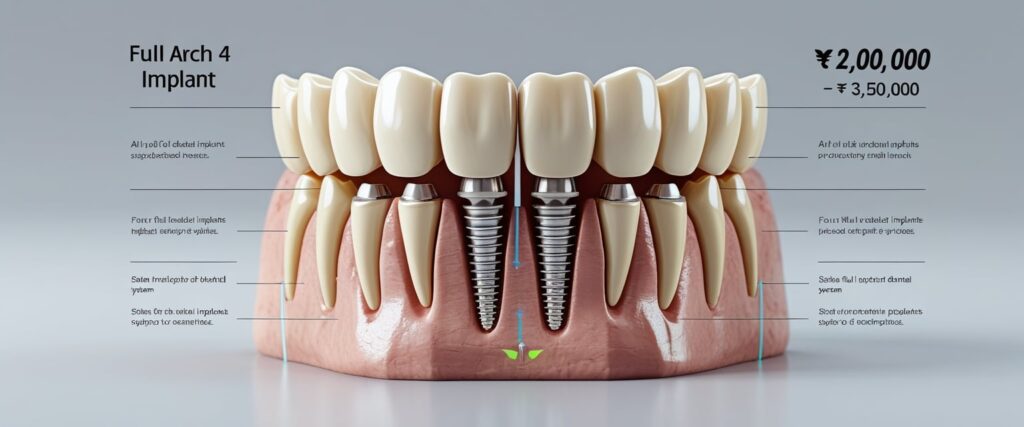
In comparison, the same procedures in the US or UK often cost $25,000–$35,000, meaning patients can save up to 70% by opting for full mouth implants in India. Many clinics also provide package deals that include scans, crowns, and follow-up visits.
City-Wise Price Differences
The dental implants cost in India varies by city. In metro areas like Mumbai, Delhi, and Bangalore, prices are usually 20–30% higher due to higher clinic overheads and demand. For example, a single implant that costs ₹25,000 in Chandigarh may cost closer to ₹35,000–₹40,000 in Mumbai.
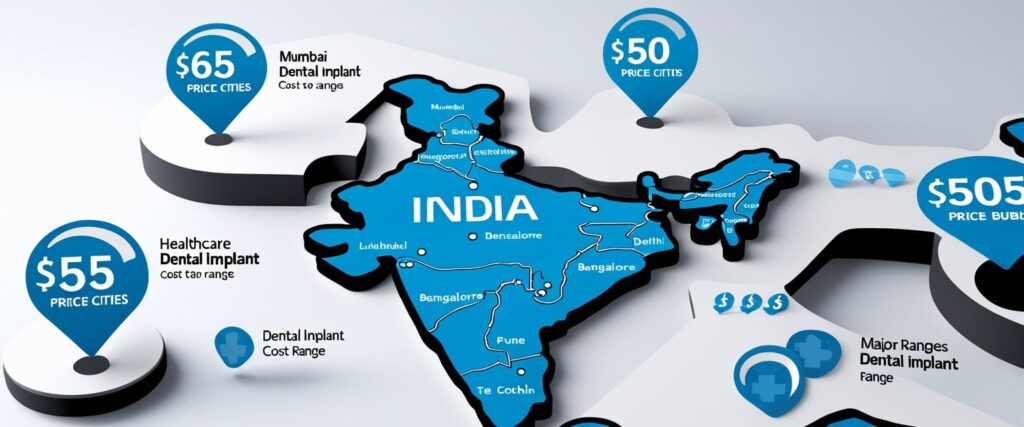
Tier-2 cities such as Pune, Cochin, and Rajkot often provide the same quality treatment at lower prices. Many patients travel to these cities to save money without compromising care.
For international patients, dental tourism hubs like Delhi and Bangalore remain popular because of advanced technology and English-speaking dentists, even if the prices are slightly higher. Clinics catering to foreigners often bundle services like airport transfers and hotel stays with dental implants in India, making treatment more convenient.
Key Factors Influencing Dental Implant Cost
The cost of dental implants depends on several clinical and material choices. Variables such as implant brand, need for supportive procedures, type of crown, and the surgeon’s expertise all play a direct role in the final price a patient pays.
Type and Brand of Implant
The choice of implant system influences both durability and cost. Premium brands like Nobel Biocare are widely recognized for their long-term success rates and advanced designs, but they usually cost more than generic alternatives.

Implants are typically made from titanium, which is biocompatible and reliable. However, some patients prefer zirconia implants, which are metal-free and more aesthetic. Zirconia implants can be more expensive due to higher production costs and limited availability.
Some clinics also charge differently based on whether they use imported or locally manufactured implants. Imported systems often come with higher laboratory and licensing fees, which add to the overall treatment cost.
Additional Procedures: Bone Graft and Sinus Lift
Not all patients have enough bone density to support an implant. In such cases, bone grafting becomes necessary to build up the jawbone. This procedure can add anywhere from a moderate to significant increase in treatment cost depending on the material used and the size of the graft.
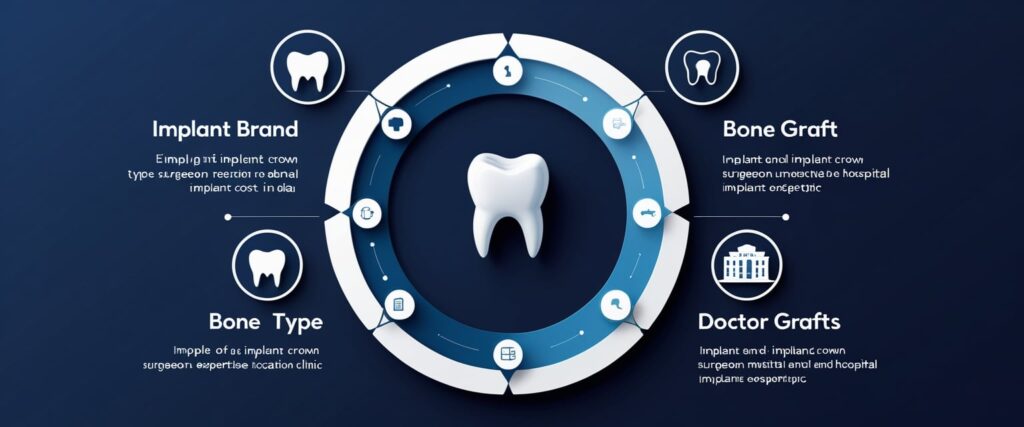
For implants in the upper jaw, especially near the molar region, a sinus lift may be required. This procedure raises the sinus floor and adds bone so the implant can be placed securely.
Both bone graft and sinus lift procedures involve extra surgical time, additional materials, and follow-up care. These factors can substantially raise the total expense compared to straightforward implant placement.
Crown Material and Abutment Choices
The visible part of the implant, the dental crown, comes in different materials. Porcelain-fused-to-metal crowns are common and cost less, but they may show a dark line at the gum over time. Zirconia crowns provide a more natural look and are stronger, but they are usually more expensive.
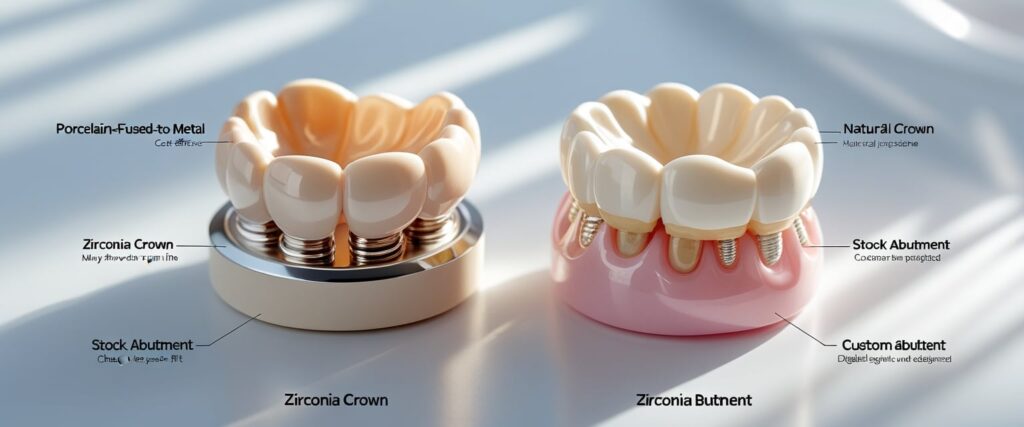
The abutment, which connects the implant to the crown, also varies. Stock abutments are cheaper but may not fit as precisely. Custom abutments, often made with advanced digital design, improve comfort and aesthetics but increase the overall price.
Patients should weigh both function and appearance when choosing crown and abutment options, as these decisions directly affect long-term satisfaction and cost.
Expertise of Oral Surgeons
The skill and training of the oral surgeon play a major role in implant success. Highly experienced surgeons often charge more, but they also reduce the risk of complications and failures.
Specialists with advanced training may also use modern techniques, such as guided implant surgery, which improves accuracy but can add to treatment fees.

While less experienced providers may offer lower prices, patients often value the added security of being treated by a surgeon with a strong track record in implantology. In many cases, paying for expertise ensures better outcomes and fewer corrective procedures later.
What’s Included in the Dental Implant Cost
The total cost of dental implants is not just about the titanium post or the crown. It usually covers several stages of treatment, from initial testing to the final placement, along with possible follow-up care and extra procedures.
Consultation and Diagnostic Imaging
The process usually begins with an initial consultation. During this visit, the dentist reviews the patient’s oral health history, checks bone density, and discusses treatment options. This step ensures the patient is a good candidate for a tooth implant.
Diagnostic imaging is a major part of this stage. X-rays or 3D scans are taken to assess the jawbone and identify exact implant placement. These scans help the dentist avoid nerves and sinuses while planning surgery.

Some clinics include these costs in the treatment package, while others bill separately. In India, diagnostic imaging may add anywhere from ₹2,000 to ₹7,000 depending on the technology used. Patients should always confirm whether consultation and imaging fees are part of the quoted price.
Implant Surgery and Components
Implant surgery is the most significant part of the cost. The procedure involves placing a titanium post into the jawbone, which acts as an artificial tooth root. This requires surgical skill, sterile equipment, and follow-up visits to ensure proper healing.
The implant itself is a key cost factor. Premium implant brands such as Straumann or Nobel Biocare may cost more than local alternatives. The abutment, a connector piece that links the implant to the dental crown, is usually priced separately.

In India, the surgical placement of a single implant can range from ₹18,000 to ₹35,000 depending on the clinic and implant brand. The total cost also includes anesthesia, surgical tools, and post-operative checkups.
Crown Placement and Aftercare
Once the implant has fused with the bone, a dental crown is placed. Crowns are usually made of ceramic, porcelain-fused-to-metal, or zirconia. The material chosen affects both durability and price.
A single dental crown in India may cost between ₹8,000 and ₹20,000. The dentist customizes the crown to match the color and shape of natural teeth, ensuring a natural appearance.

After crown placement, patients often receive follow-up visits to monitor healing and bite alignment. Some clinics include these visits in the package, while others may charge separately. Proper aftercare is essential for long-term implant success.
Hidden and Additional Charges
Patients should be aware of possible extra charges. Bone grafting or a sinus lift may be required if the jawbone is too thin or weak to support implants. These procedures can add ₹10,000 to ₹40,000 depending on complexity.
Other hidden costs may include temporary dentures, medication, or extended follow-up care. Some clinics charge separately for 3D scans, while others bundle them into the total package.

It is important to ask for a detailed breakdown of all charges. Transparent pricing helps patients compare options more effectively and avoid unexpected expenses when planning dental implant treatment.
Comparing Dental Implants with Other Tooth Replacement Options
Dental implants are often considered alongside bridges and dentures when deciding on tooth replacement. Each option differs in cost, durability, and impact on oral health, which makes understanding their differences important for long-term planning.
Dental Implants vs. Bridges
A dental bridge usually relies on the support of nearby teeth. The dentist reshapes the surrounding teeth and places crowns to hold the bridge in place. While this can restore chewing function, it may weaken healthy teeth over time.
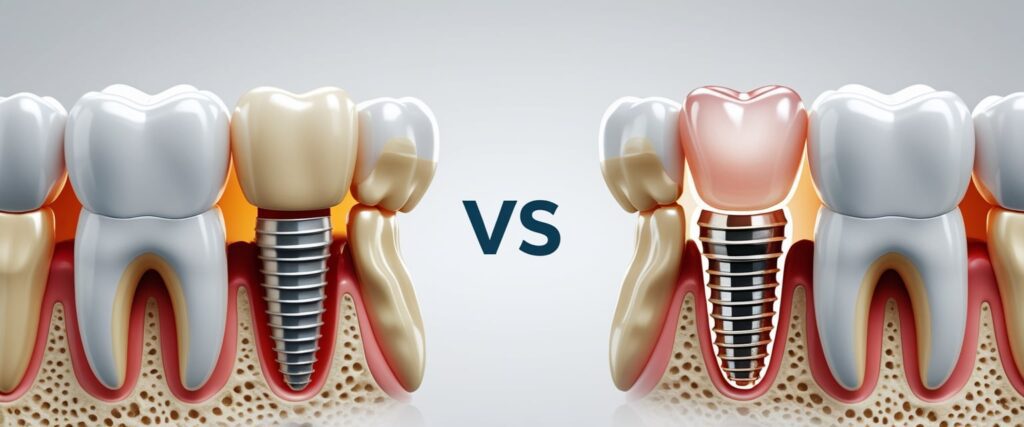
A single tooth implant, on the other hand, is anchored directly into the jawbone. This preserves the natural structure of nearby teeth and helps maintain bone density. Bridges do not provide this benefit, which can lead to gradual bone loss in the jaw.
Cost comparison:
- Bridge: Typically less expensive upfront, often ranging between $1,500–$3,000 per tooth in many regions.
- Implant: Higher initial cost, but longer lifespan and less need for replacement. In India, a tooth implant may start around ₹25,000–₹45,000 depending on the clinic.
Patients who want to avoid altering healthy teeth often prefer implants, while those seeking lower upfront costs may choose bridges.
Dental Implants vs. Dentures
Dentures are removable replacements for missing teeth. They can be full or partial, depending on the number of teeth missing. While dentures are more affordable, they often require adjustments as the jawbone changes shape.
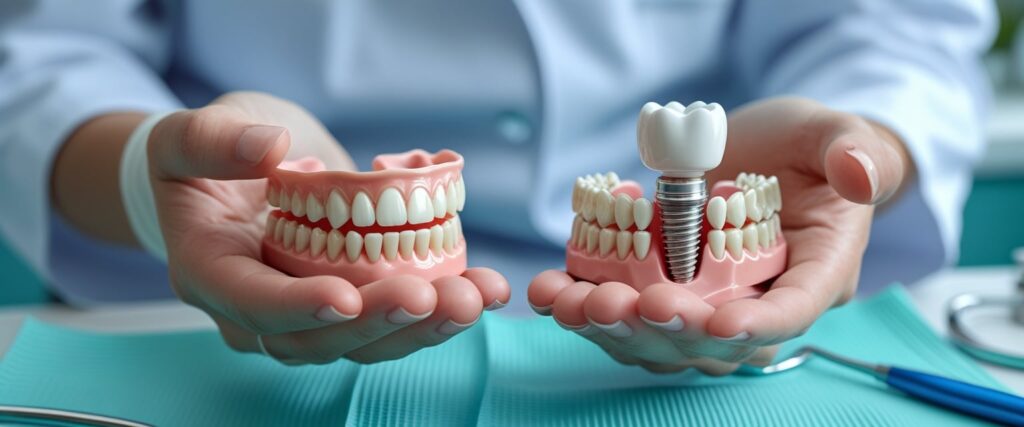
Dental implants, by contrast, are fixed solutions. They integrate with the jawbone, which prevents bone shrinkage and provides stronger bite force. Patients report that implants feel and function more like natural teeth compared to dentures.
Key differences:
- Dentures: Lower cost, but can slip, affect speech, and may need relining.
- Implants: Higher cost, but stable, natural-looking, and preserve bone health.
According to Balanced Dental Studio, implants are often recommended for long-term stability, while dentures remain a budget-friendly option.
Long-Term Value and Investment
While bridges and dentures may cost less initially, they often require replacements or adjustments within 5–10 years. This can add up over time.
A dental implant, though more expensive upfront, can last 20 years or longer with proper care. This makes implants a cost-effective solution in the long run.

Implants also reduce hidden costs. They prevent bone loss, protect facial structure, and avoid the need for frequent dental visits to adjust or replace prosthetics. Patients who view treatment as a long-term investment often find implants provide better value compared to alternatives like bridges or dentures.
For example, Redent Klinik highlights that while implants in Western countries may cost $3,000–$6,000, in India and other regions they are far more affordable, making the long-term value even more appealing.
Conclusion
When considering long-term oral health, the Average Cost of Dental Implants in India: 2025 Pricing Guide provides valuable clarity for both local and international patients. With treatment options ranging from single tooth implants to full mouth restorations, the Average Cost of Dental Implants in India: 2025 Pricing Guide helps patients understand realistic price expectations before starting treatment.
One of the biggest reasons people search for the Average Cost of Dental Implants in India: 2025 Pricing Guide is to compare costs with the US, UK, and other countries where implants can be up to 70% more expensive. By following this Average Cost of Dental Implants in India: 2025 Pricing Guide, patients can see how much they save without compromising on quality.
The Average Cost of Dental Implants in India: 2025 Pricing Guide also highlights city-wise differences, from affordable treatment in Tier-2 cities to premium clinics in metros like Delhi and Mumbai. In addition, this Average Cost of Dental Implants in India: 2025 Pricing Guide explains how implant type, crown material, and surgeon expertise affect the total expense.
For those planning dental tourism, the Average Cost of Dental Implants in India: 2025 Pricing Guide ensures transparency in pricing, covering everything from consultation to crown placement. Ultimately, the Average Cost of Dental Implants in India: 2025 Pricing Guide shows that India offers one of the best balances of affordability, technology, and expert care in the world.
Frequently Asked Questions
Dental implant costs in India vary depending on the type of implant, the city, and whether treatment is done in a private clinic or a government hospital. Prices can range from affordable options in teaching hospitals to premium packages in metro city clinics.
What is the average price for a single tooth implant in India?
A single tooth implant in India usually costs between ₹25,000 and ₹60,000. Premium brands like Straumann or Nobel Biocare can raise the price to ₹1,00,000 per tooth. More details on updated costs are available in this 2025 dental implant price guide.
How much does a full set of dental implants cost in India?
A full-mouth implant procedure such as All-on-4 typically costs ₹2,00,000 to ₹3,50,000. All-on-6 or zygomatic implants may cost between ₹2,50,000 and ₹7,00,000 depending on the case. Patients can compare options in this complete breakdown of implant costs.
Can you get free dental implants in India, and if so, where?
Free dental implants are not common in India. Some government dental colleges and charitable hospitals may provide implants at little or no cost under training programs, but availability is limited and usually meant for selected patients.
What are the costs associated with dental implants in government hospitals?
Government hospitals and dental colleges often provide implants at reduced rates compared to private clinics. Costs may range from ₹10,000 to ₹25,000 per implant, depending on the institution and whether the treatment is part of a teaching program.
What is the cost range for dental implant screws in India?
The screw, or implant fixture, usually costs between ₹10,000 and ₹25,000 for standard titanium options. Premium imported screws can cost up to ₹40,000. The final price also depends on the brand used by the dental clinic.
How much does it cost for dental implants at AIIMS Delhi?
At AIIMS Delhi, dental implant costs are subsidized. A single implant may cost around ₹15,000 to ₹20,000, making it one of the most affordable options in India. However, patients often face long waiting times due to high demand.
